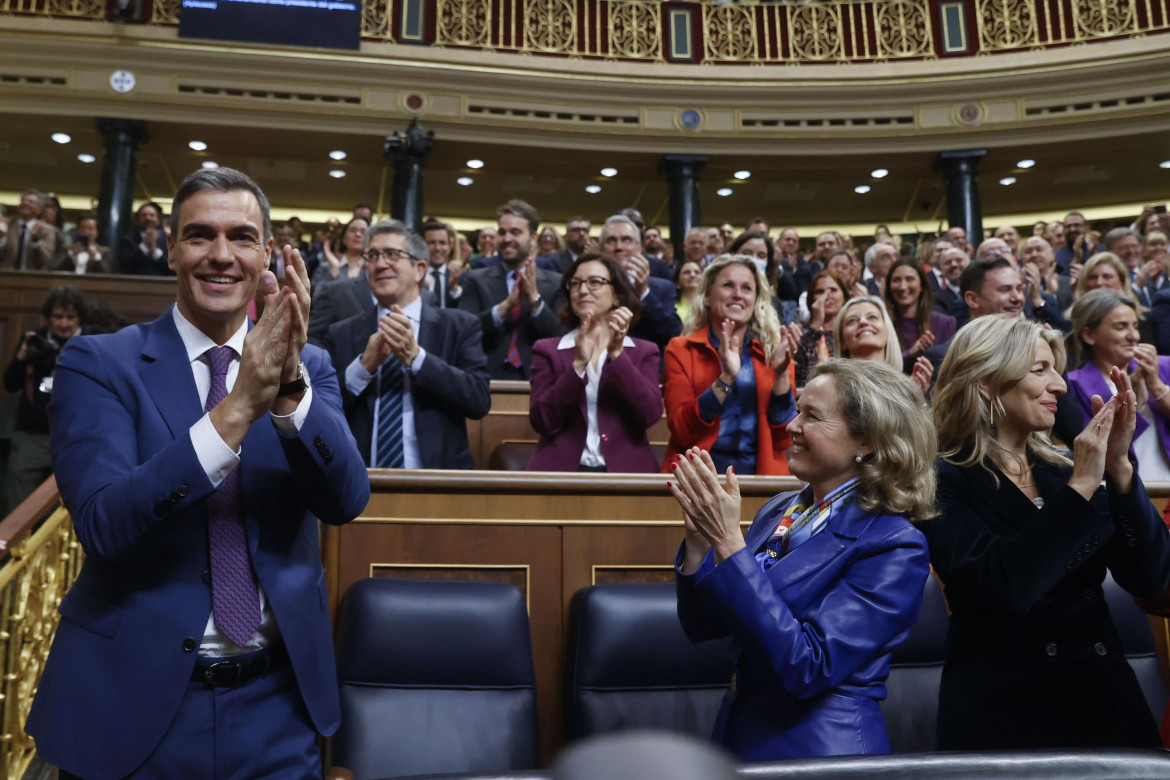Analysis
Sánchez is still president, and over half the Spanish Parliament is with him
The parties that voted 'yes' to his investiture accounted for 12.6 million votes, more than 1.3 million more than Vox and the Popular Party. But it won't be an easy parliament to manage.

The third government headed by Pedro Sánchez has begun. On Thursday, with an absolute majority of 179 “yes” against 171 “no” votes, the Socialist leader succeeded in the historic feat of bringing all Spanish political forces together to stop the danger of fascism.
This was no small accomplishment: PSoE had to take back many of the proclamations and categorical promises it made over the past years, in which it hadn’t the courage to defend a political solution for Catalonia. But he now represents the highest number of actual voters in his career as Prime Minister: the parties that voted “yes” to his investiture accounted for 12.6 million votes, more than 1.3 million more than Vox and the Popular Party.
During the two-day investiture debate, the Prime Minister defended amnesty for all those involved in the process of trying to secure Catalonia’s independence, not only as a prerogative afforded by the Constitution but also as a necessary solution for coexistence. He also put forward some small-scale social measures (e.g., aid for transportation and food) and a couple of interesting novelties (already expected in the past weeks): a (small) decrease in the workday to 37.5 hours per week and an increase of maternity and paternity leave from 16 to 20 weeks. However, the crux of the debate was the amnesty, something completely unacceptable to the right wing, which said it was willing to do anything to prevent it.
Just as in the last legislature it was Podemos that forced the Socialist Party to stay the course towards the left, in the one that begins now, the agreements with the independence parties in order to win the confidence vote has forced the Socialists to embrace the virtue of political pragmatism: the PP’s strategy of fighting separatism with violence and the penal code has led to an unacceptable situation of instability, and only a policy of forgiveness, with pardons and now amnesty, will return the issue to the realm it should never have left: that of politics. Without the need to get the votes of Junts and Esquerra, the PSoE most likely wouldn’t have reached this step. Now the challenge of pacifying the Catalan situation has kicked off. It won’t be easy, because the right is more belligerent than ever.
The tone of the debate has been particularly bitter: the atmosphere in Parliament was very heavy, and Popular Party leader Alberto Núñez Feijóo promised war, while the Vox group left the chamber without even listening to Sánchez’s rebuttals to the incendiary speech of their leader, Santiago Abascal, and without even greeting the new Spanish Prime Minister after the vote. Even the PP is now disregarding all norms of behavior: the “son of a bitch” uttered by the PP president of the Madrid community, Isabel Díaz Ayuso to Sánchez during the investiture debate went viral. The message went out loud and clear to those protesting in the streets: the government is illegitimate, Sánchez is Hitler – as Abascal said – and every weapon is legitimate to fight him.
“We will respond blow by blow,” Ayuso said a couple of days ago. On Thursday, four Socialist deputies were attacked in a bar outside Parliament, with eggs being thrown at them to the shouts of “Traitors, they should kill you!”
It won’t be an easy legislature to manage, also because Sánchez will have to find agreement among eight parties to pass any law, without room for dissent, while the right has to agree between just two to get 171 votes. But it is also true that Sánchez has managed to survive much longer than his detractors would ever have imagined and may hold further aces up his sleeve.
The problem is that there’s no shortage of resentment to his left, and now that the game is on for the ministerial seats, it will become clearer how the four or five ministries that belonged to Sumar’s party will be distributed.
What seems clear is that, after Podemos’ parliamentary representation was virtually wiped out, its former ministry portfolios, that of Equality held by Irene Montero (whom her party continues to want for that post) and that of Ione Belarra, leader of the Purple Party and outgoing Minister of Social Rights, will also disappear. Izquierda Unida leader Alberto Garzón will also have to step down, and it is unlikely that those two parties, the backbone of the Spanish left, will have any representatives among the cabinet.
Originally published at https://ilmanifesto.it/sanchez-ancora-presidente-oltre-mezzo-parlamento-con-lui on 2023-11-17
